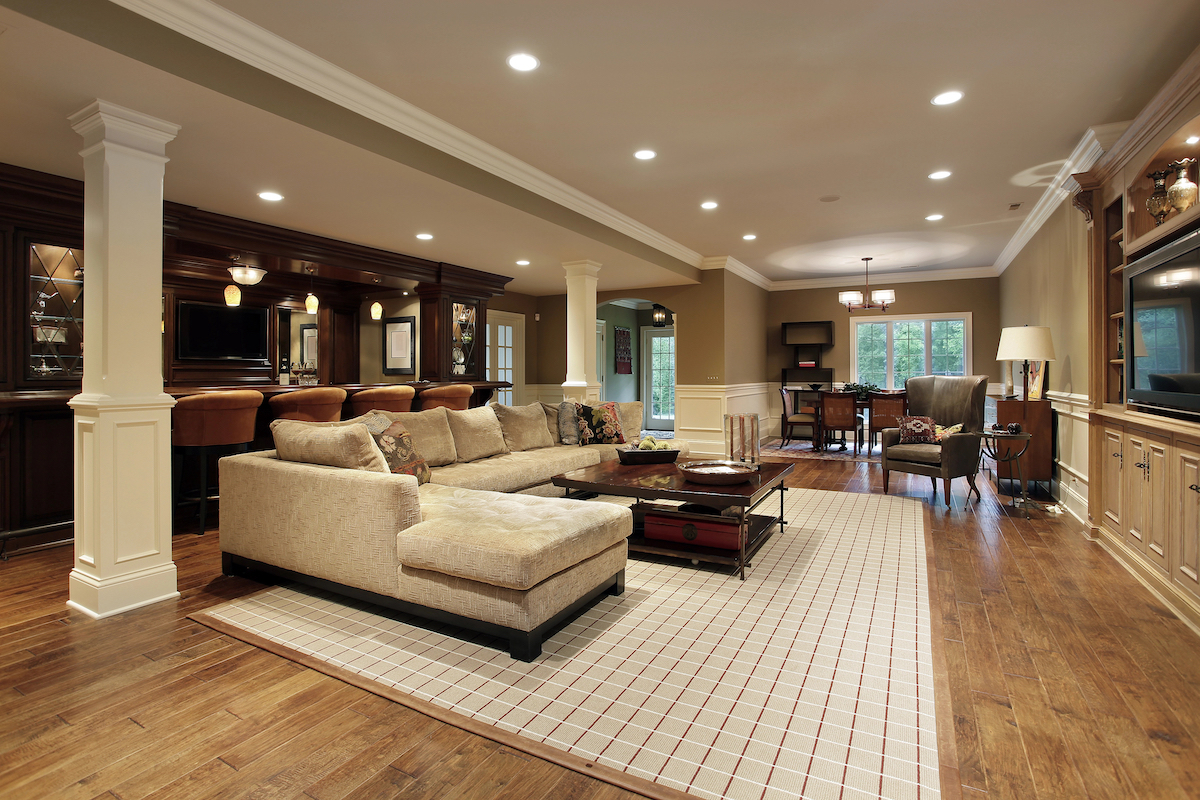

We may earn revenue from the products available on this page and participate in affiliate programs. Learn More ›
This content is presented by The Home Depot. The included facts and opinions are those of BobVila.com.
The basement floor is typically made of solid, sealed concrete that is designed for long-lasting durability. However, the plain appearance, hard texture, and cold temperature can definitely make the basement an unappealing place. Updating the basement floor is a good way to enhance the overall aesthetic appeal and comfort of the basement, making it a more attractive location to work, play, or relax.
Before updating the flooring, it’s necessary to consider the condition of the concrete and whether the new floor will require a subfloor. Cracks in basement floor concrete should be fixed with a concrete repair kit and basement floor sealer, instead of trying to cover them up with the new basement flooring. Some flooring options, including paint, epoxy, and rubber flooring, can be installed directly over the concrete floor, but other options, like engineered wood or cork flooring, will require a subfloor for proper installation.
According to Angi, the average cost of flooring installation for a 500-square-foot space ranges from $1,531 to $4,861. With such a wide range, it’s important to compare various flooring materials to ensure they fit your budget. There are a broad variety of basement flooring options from which to choose. Use this guide to learn more about them, in order to make an informed decision for your home.
What to Consider When Choosing Basement Flooring
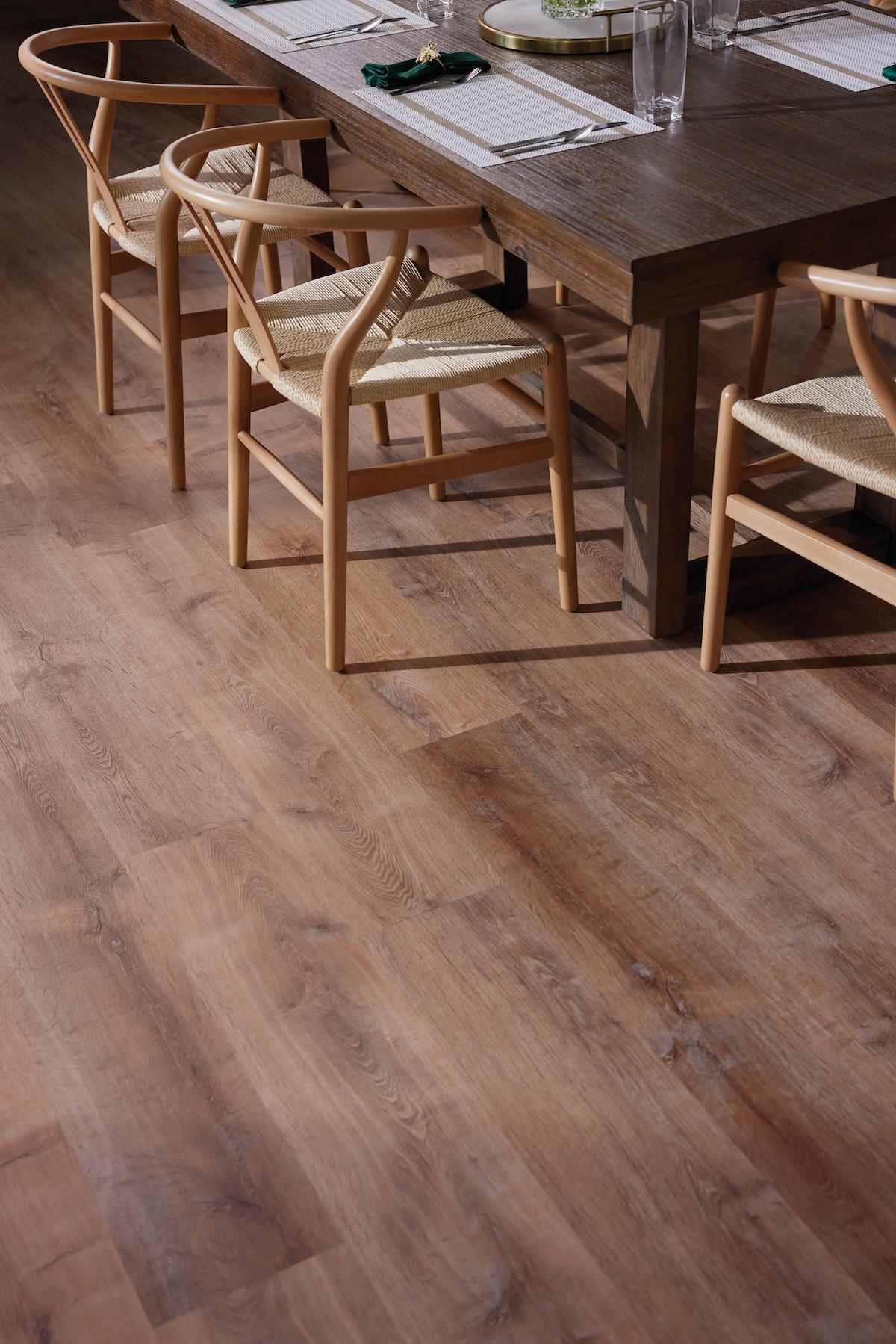
The flooring you choose for your basement will depend not only on your material preference—taking into account appearance, durability, and moisture resistance—but also on cost and ease of installation. If the ceilings are low, you may need to consider whether a subfloor would make a cramped space even more so.
Basement Flooring Options That You Can DIY
1. Paint
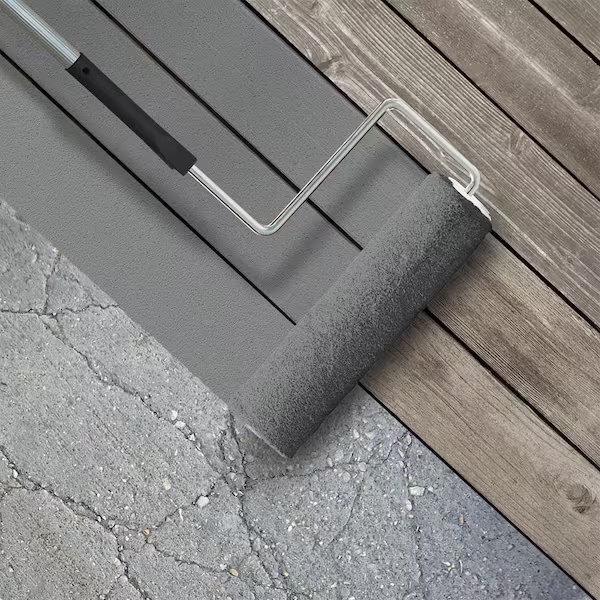
Basement floor paint is one of the easiest and most affordable options for renovating the basement. Oil-based paints create a hard, shiny finish that covers slight surface imperfections and can be applied directly to the concrete with a paintbrush, roller, or even a paint sprayer. Look for flat or matte paints that offer a non-slip or textured finish for your basement floor painting project. Just make sure that the floor is clean and dry before attempting to paint basement floor concrete, otherwise the paint may not adhere properly. This flooring idea is simple to DIY, even for beginners, though paint doesn’t last as long as many other flooring options.
Pros: Paint is available in a wide selection of colors, it’s affordable, and it’s the easiest flooring option to apply.
Cons: Painted concrete is susceptible to chipping, bubbling, and peeling, so it may need to be touched-up regularly to keep the floor looking great.
Our recommendation: BEHR Premium Porch and Patio Floor Paint – Get it at The Home Depot for $42.98 per gallon.
Behr Premium Porch and Patio Floor Paint can be used both outdoors and indoors to create an anti-slip coating that’s ideal for concrete floors. This product is resistant to scuffing, fading, cracking, and peeling, making it suitable for long-lasting basement floor performance, though proper surface preparation is essential for optimal results.
2. Concrete Stain
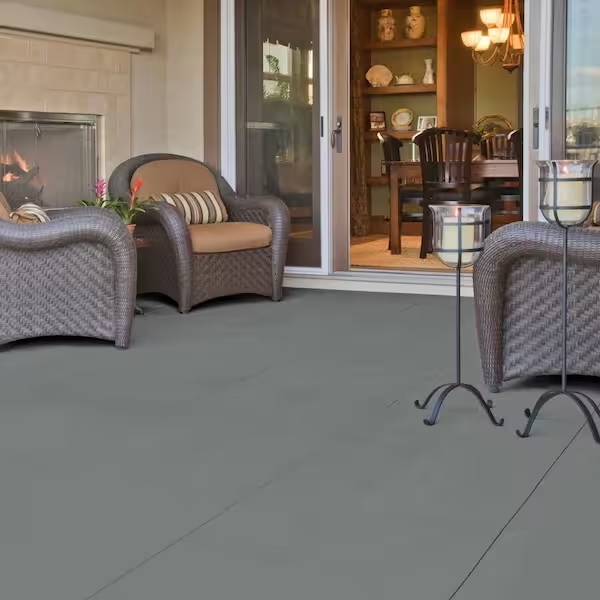
Concrete stain is similar to paint and epoxy in that it can be applied directly to the concrete floor with a paint brush, roller, or paint sprayer. However, this flooring idea doesn’t adhere to the concrete, like paint or epoxy. Instead, the stain is absorbed into the concrete, allowing the color to penetrate the porous flooring. Beginner DIYers can use water-based stain to update the appearance of the floor, while more experienced DIYers may choose to use an acid-based method for a more unique look that is then finished with a concrete sealer.
Pros: Concrete stain is an affordable, easy-to-use method with a wide variety of appealing aesthetic options.
Cons: Concrete stain does not improve the durability of the floor and can actually call attention to the cracks, divots, or other imperfections in the concrete.
Our recommendation: BEHR Concrete Stain (5 gallons) – Get it at The Home Depot for $173.
Applying Behr Concrete Stain to the basement floor is an effective option for enhancing the appearance of the room. This stain creates a protective layer that is resistant to stains, chemicals, and abrasion damage. Additionally, you can choose from an impressive range of colors to get the ideal look for your basement.
3. Epoxy
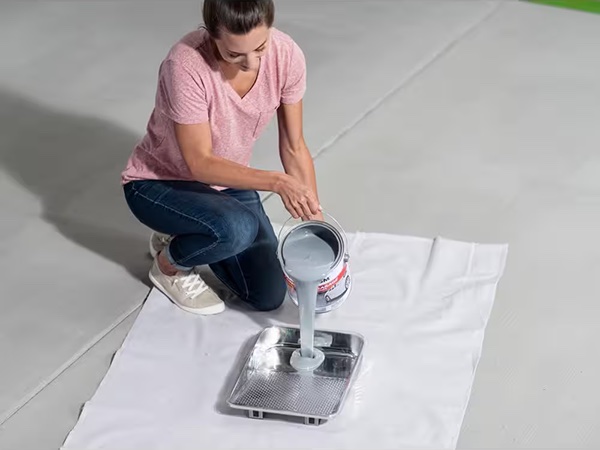
Epoxy can be applied directly to the concrete floor to update the appearance of the basement. This flooring option is applied in a similar way as paint using a paint brush and roller to coat the concrete surface. Basement floor epoxy is one of the best options for homes with moisture-related issues because epoxy is a waterproof basement flooring solution. Concrete is a porous material that is vulnerable to water damage, but epoxy can help seal and protect the underlying concrete surface. Epoxy basement floor treatment is available in a range of colors, patterns, and textures. It can even be mixed with fine sand or plastic flakes for a unique finish.
Pros: Epoxy is easy to apply, lasts for 7 to 20 years, and has a high resistance to moisture and abrasive damage.
Cons: Epoxy may not adhere properly to wet or dirt floors, and after installation it may be too slippery without adding a skid-resistant top coat.
Our recommendation: Rust-Oleum Epoxy Concrete Floor Treatment (5 gallons) – Get it at The Home Depot for $201.76.
Intended for fast, easy application, Rust-Oleum’s Epoxy Concrete Floor Treatment is a self-priming product that can be applied to the garage floor, concrete porch, walkway, and basement floor. The epoxy solution is highly resistant to chemicals, staining, and abrasion, and it’s ready for regular use within 5 days of application. You can choose between a 1-gallon can or a 5-gallon bucket, depending on the size of the basement.
4. Luxury Vinyl Plank
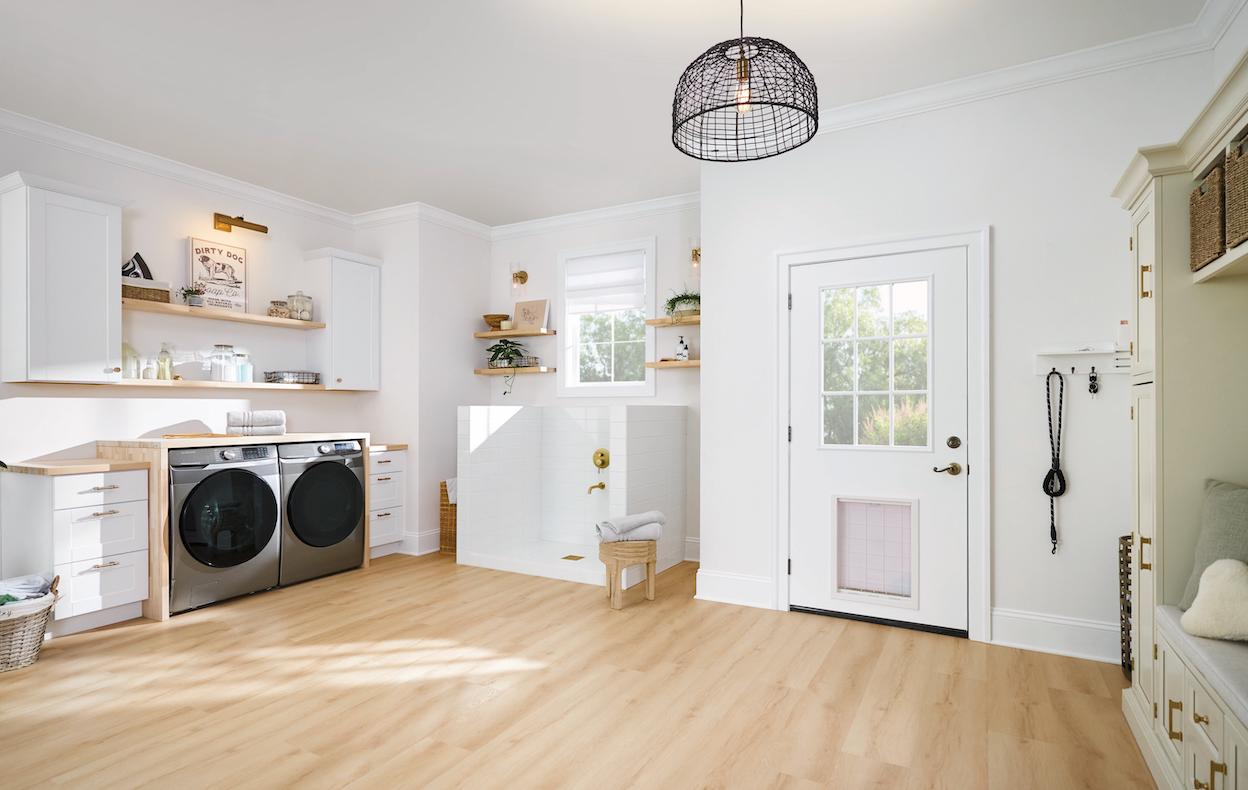
Similar to sheet vinyl, luxury vinyl plank (LVP) flooring is a resilient material that can be installed directly over concrete, though it works best with a subfloor. Having a subfloor will also help to keep the basement floor warm. LVP flooring comes in separate pieces that are joined together using a tongue-and-groove system to create a floating floor. The material is available in a variety of colors, textures, and patterns, including wood and stone replications. Opt for LVP flooring to get a durable finish that is easy to clean and looks great in the basement.
Pros: Luxury vinyl plank is water-resistant, durable, and easy to clean and maintain.
Cons: It may fade if it’s exposed to direct sunlight for extended periods and the material may dent under the weight of heavy appliances or furniture.
Our recommendation: Lifeproof Vesinet Oak Luxury Vinyl Plank Flooring – Get it at The Home Depot for $3.28 per square foot.
Basements are known to be moisture-prone, but with Lifeproof Vesinet Oak Luxury Vinyl Plank Flooring you get a 100 percent waterproof floor that interlocks to create a watertight seal. This LVP flooring boasts a high level of scratch and stain resistance, as well as built-in anti-microbial properties to resist the growth of mold and mildew. Choose from a variety of styles, colors, and finishes to find the best flooring design to enhance your basement aesthetic.
5. Rubber Flooring
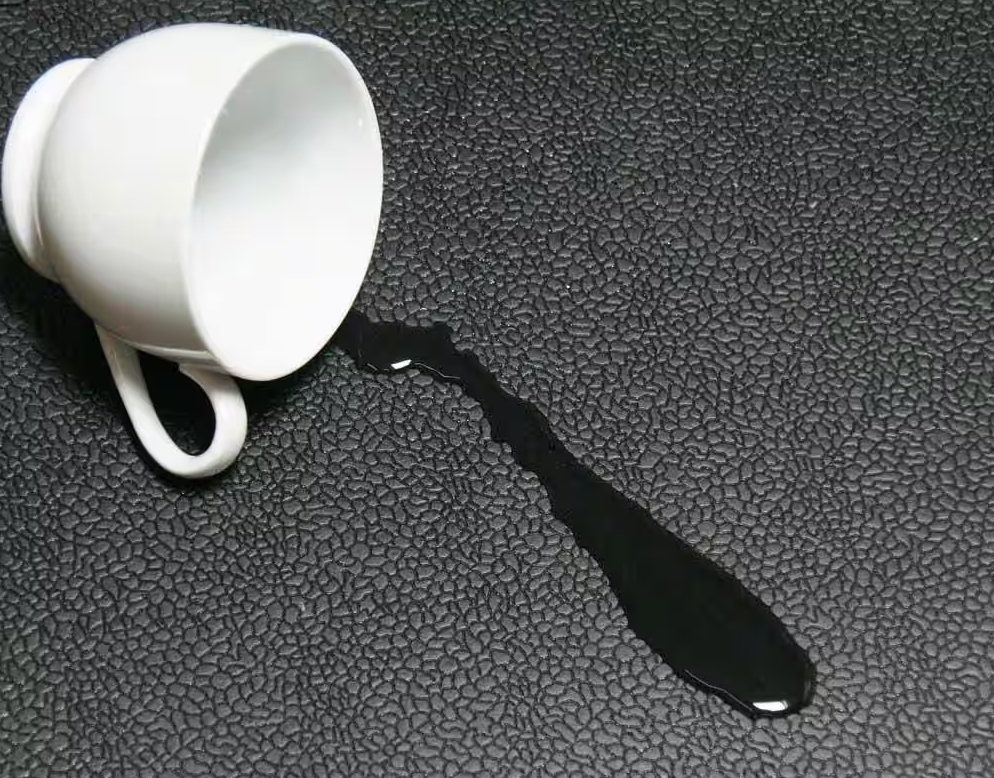
Rubber flooring may sound odd, but it’s actually a very common option that can be seen in health clubs, gyms, playrooms, and laundry rooms. The interlocking rubber tiles are easy to install and they provide an insulating layer that helps to keep the basement floor warm underfoot. Rubber flooring is a waterproof and stain-resistant material that is relatively easy to keep clean, though it is vulnerable to damage from sharp objects, heavy appliances, and furniture.
Pros: Rubber flooring is comfortable to walk on, waterproof, and stain-resistant. It helps to absorb echoes and other sounds in a wide-open basement.
Cons: It tends to cost more than many other flooring options and may have an unpleasant odor that takes a few weeks to a few months to fully dissipate.
Our recommendation: Rubber-Cal Armor-Lock Interlocking Rubber Tiles – Get it at The Home Depot for $4.38 per square foot.
Ideal for home gyms or basement workshops, Rubber-Cal Armor-Lock Interlocking Rubber Tiles protect the underlying concrete or subfloor from heavy equipment and tools. This flooring material features interlocking tabs that allow the tiles to fit together like pieces of a puzzle, making installation simple for even beginner DIYers. Once installed, the tiles are easy to clean and can be lifted out of place to clean under the floor when necessary.
6. Carpet Tile
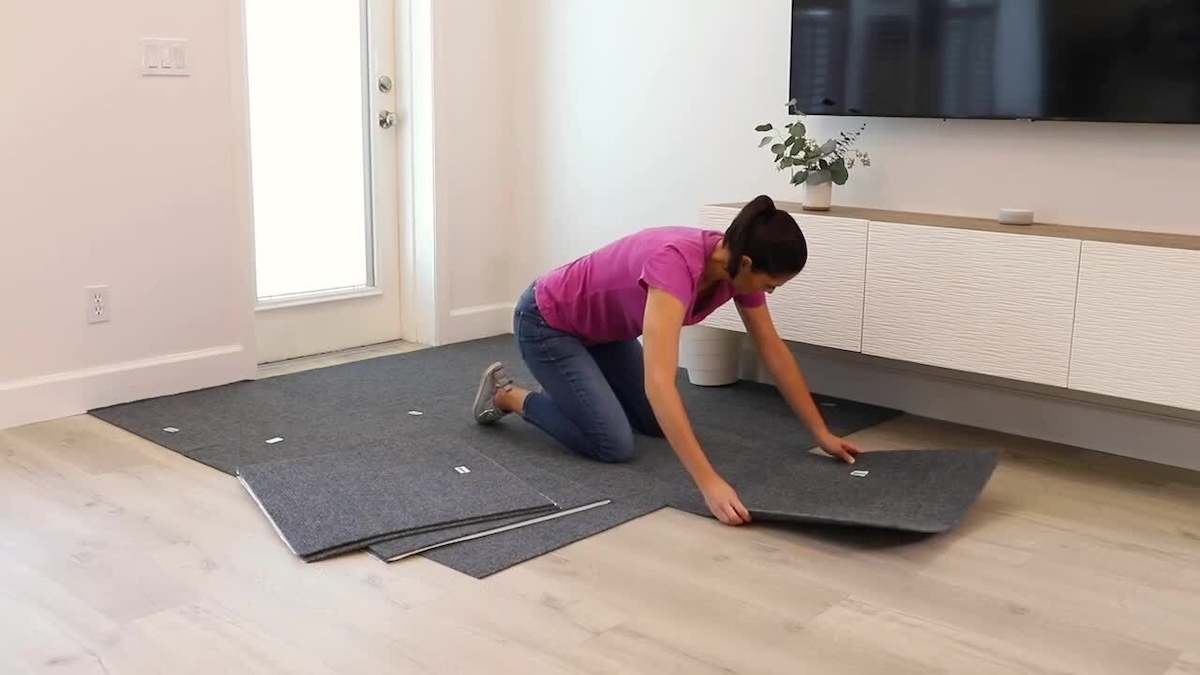
Laying carpet in the basement can help to increase the comfort of the space, but carpeting is susceptible to water damage. To reduce the risk of having to replace the entire floor, it’s a better idea to install carpet tiles, which come in individual pieces that adhere directly to the concrete or to the subfloor surface. You can also install memory foam carpet pads to improve moisture-resistance and comfort underfoot. This flooring option is durable and long lasting, so if there is a minor flood or a leak, the affected carpet tiles can be removed, cleaned, dried, and reinstalled.
Pros: Carpet tiles are a peel-and-stick option that is cost-effective, durable, and capable of hiding imperfections in the concrete or subfloor.
Cons: Carpet tiles can become frayed or faded over time and may not be as visually appealing as other flooring options.
Our recommendation: Foss Contender Carpet Tile Squares – Get it at The Home Depot for $0.97 per square foot.
Novice DIYers will appreciate the simplicity of installing these Foss Contender Carpet Tile Squares, which have a simple peel-and-stick design. These carpet tiles measure 24 inches by 24 inches, allowing you to cover more area of the floor in less time. The tiles are stain-resistant, UV-resistant, and kid/pet friendly, making them a popular choice for busy family homes.
7. Sheet Vinyl

Another type of flooring that can be applied directly over concrete is sheet vinyl basement flooring, though it may be beneficial to add a subfloor if the underlying concrete is rough or has a lot of irregularities. This material is available in full rolls, so while it is still important to measure the area of the basement, you won’t have to deal with individual tiles. Sheet vinyl is available in a variety of styles and patterns. The material is durable, easy to clean, and installation is relatively straightforward. However, it is a good idea to plan ahead of time for getting the roll of sheet vinyl into the basement, cutting it to the proper size, and fitting it between the walls.
Pros: Sheet vinyl can be purchased in bulk rolls to help reduce the overall cost, and it is relatively straightforward to install.
Cons: Sheet vinyl is prone to discoloration, and any roughness or irregularities in the concrete will typically show through the vinyl material.
Our recommendation: Lifeproof Travertine Plank Stone Sheet Vinyl – Get it at The Home Depot for $1.34 per square foot.
Available in a variety of colors and textures, Lifeproof Sheet Vinyl Flooring is an excellent way to improve the appearance of the basement. The sheet vinyl material is made to be waterproof and resistant to stains, scuffs, and scratches, making it ideal for basement playrooms or other high traffic areas. This easy-to-install product can be installed directly over concrete or it can be applied over a wooden subfloor to give the basement a bit more cushion underfoot.
8. Cork
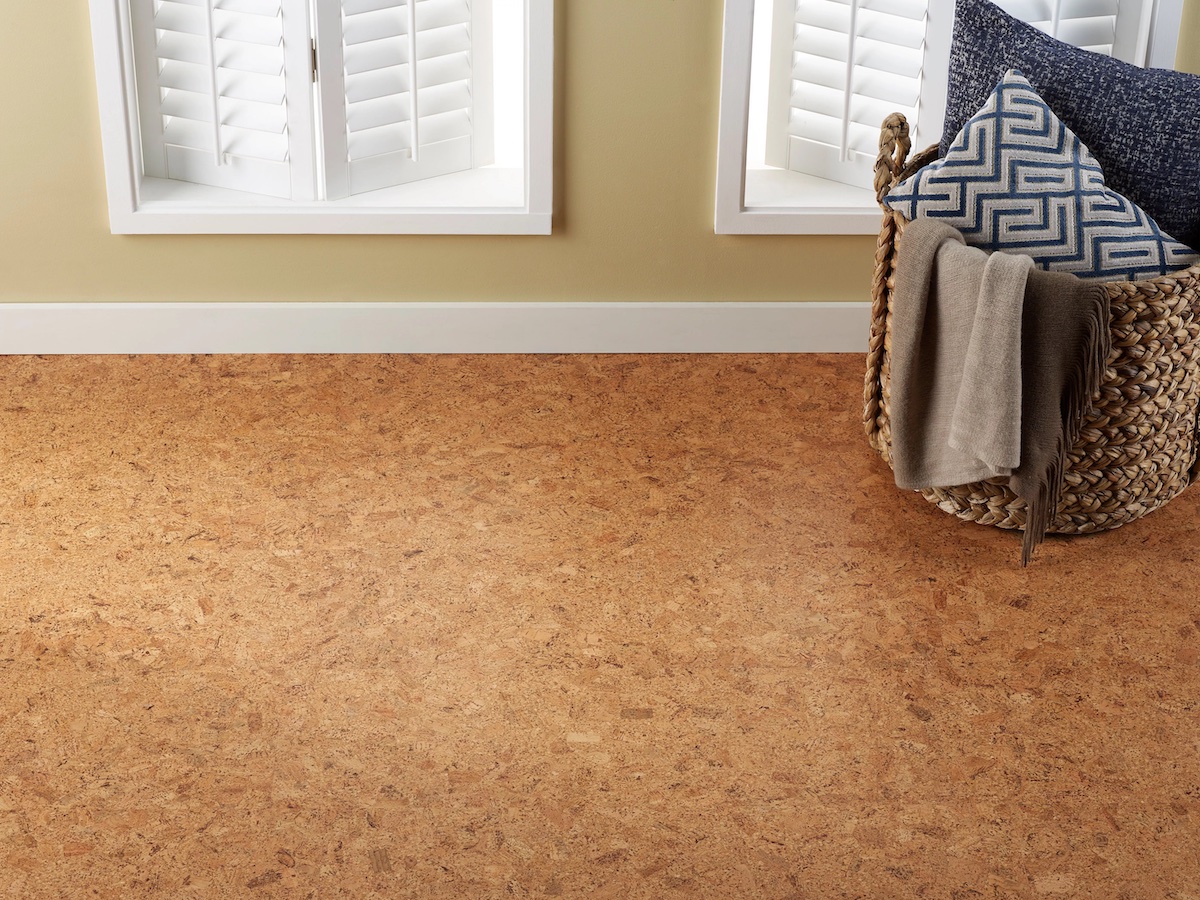
Adding cork flooring to the basement can be a great way to improve the look and feel of the home. The cork material is softer than engineered wood, making it more comfortable for walking, sitting, or standing. It also provides sound insulation and absorption, reducing the amount of echoing and other noises in the open basement space. However, cork is not the right option for installing directly over concrete. Instead, make sure to have a subfloor installed to get the best results with a cork floor.
Pros: Cork is an eco-friendly product that is comfortable underfoot and provides excellent sound and temperature insulation.
Cons: It is vulnerable to physical damage from sharp or heavy objects and it tends to fade when exposed to direct sunlight.
Our recommendation: Ari Smooth Cork Plank – Get it at Floor and Decor for $4.19 per square foot.
Superior sound absorption is an important quality for a basement floor, which is just one reason why adding Ari Smooth Cork Plank to your basement is a great idea. The cork flooring also has a natural variation in tone and texture that helps the room stand out. Consider this cork flooring product to get a durable, renewable, and comfortable basement floor.
9. Bamboo
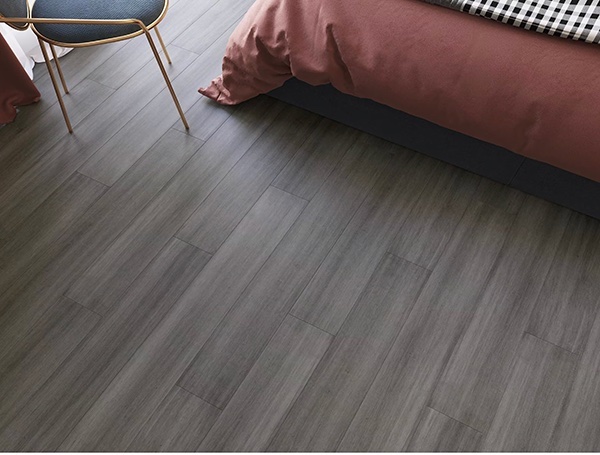
One of the main reasons bamboo flooring is chosen over hardwood is that it’s an eco-friendly option with a lower average cost. Installing bamboo flooring for the basement can be a good choice as long as you have a subfloor and underlayment for proper moisture protection. This basement flooring material is also hard, durable, and long-lasting, allowing it to hold up well in most homes, though it’s recommended to treat the floor with a protective sealant after installation to reduce the risk of moisture damage, scratches, and stains.
Pros: Bamboo is highly durable, and relatively low maintenance. It’s a fast-renewing resource, making it an eco-friendly choice, compared to hardwoods that can take decades to mature.
Cons: This material offers limited refinishing options due to the hardness of the material, and it’s vulnerable to moisture damage and abrasion damage, especially in high-traffic areas.
Our recommendation: Lifeproof Berkeley Engineered Bamboo Flooring – Get it at The Home Depot for $3.69 per square foot.
For homeowners who are looking for sustainable flooring choices, Lifeproof’s Berkeley Bamboo Flooring is an excellent option for kitchens, baths, and basements. The bamboo flooring has a rapid locking system that improves installation speed and it’s available in several stylish designs, each made with seven layers of protective coating for enhanced durability and moisture-resistance.
10. Ceramic Tile
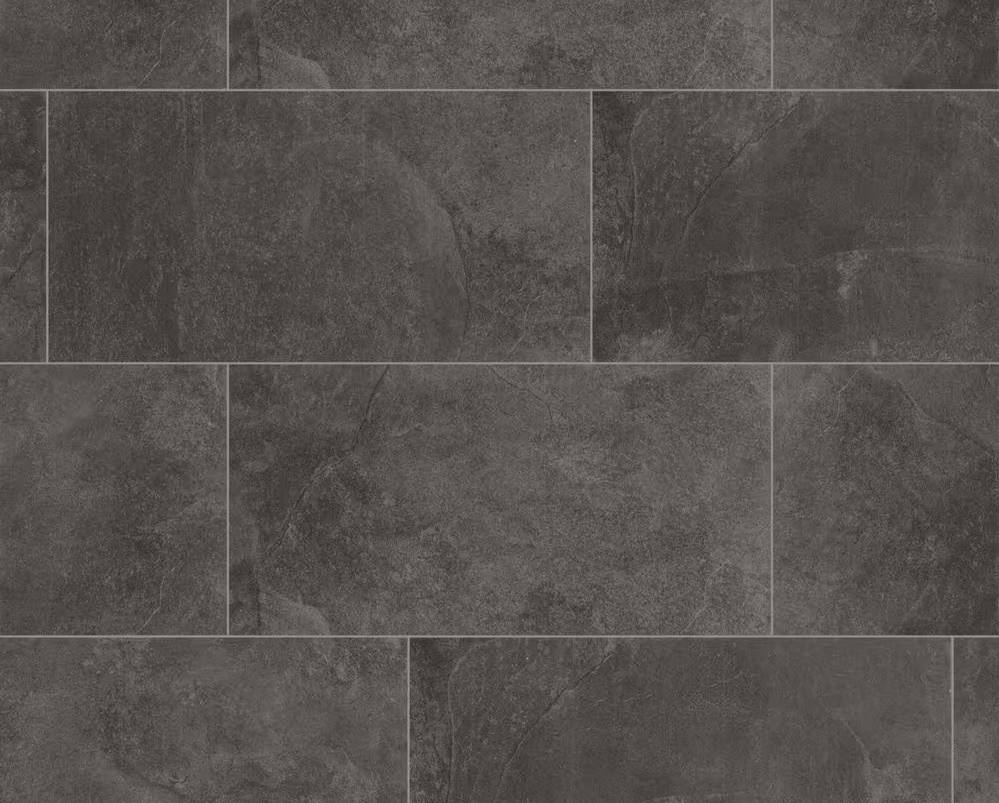
Ceramic tile can be an interesting option to use for a basement floor because the tiles can be arranged in an almost unending variety of patterns to create a unique design. Basement floor tiles can be applied directly over the concrete floor, though it’s recommended to put in a subfloor to ensure that the tile isn’t too cold to the touch. Ceramic tile is a waterproof option that won’t get damaged if someone spills a beverage on the floor. It’s also durable and relatively easy to clean, making it a good choice for homes with kids or pets.
Pros: Ceramic tile is a waterproof option that is durable, easy to clean, and available in a variety of colors and patterns.
Cons: Ceramic tile is a cold, hard flooring option that can be costly and difficult to install.
Our recommendation: Daltile Cascade Ridge Slate Ceramic Tiles – Get it at The Home Depot for $1.59 per square foot.
Designed for beauty and functionality, Cascade Ridge Slate Ceramic Tiles have slip-resistant textures that are easy to clean. These ceramic tiles display an attractive, modern appearance that resembles natural slate, giving these tiles a popular aesthetic appeal for just about any basement floor.
Pricing is accurate as of publication on March 7, 2025.
